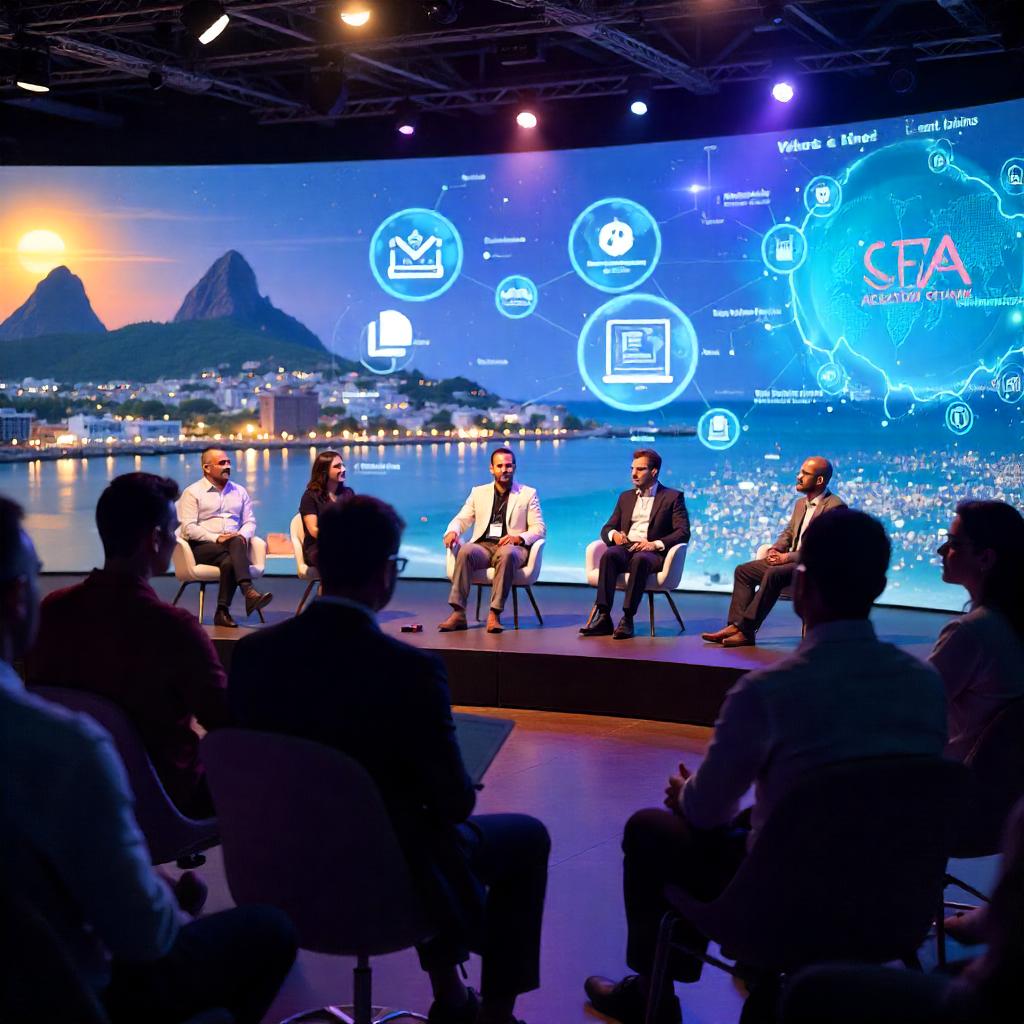Positioning Brazil as a Blockchain Leader
Blockchain.RIO 2025 stands as a testament to Brazil’s leadership in the blockchain and Web3 sectors, offering a comprehensive platform for innovation, regulation, and education. Held from August 5 to 7, 2025, in Rio de Janeiro, the event attracted over 20,000 participants, including industry leaders, regulators, and academics, all converging to explore the future of decentralized technologies in Latin America.
Understanding the multifaceted nature of blockchain technology, Blockchain.RIO 2025 curated over 30 specialized tracks to cater to a wide array of professionals. Among these, CRIA, led by Brazil’s Securities and Exchange Commission (CVM), focused on the intersection of innovation and regulation, emphasizing the importance of regulatory frameworks in fostering a secure blockchain environment. The “Regulation Rocks” track, curated by FENASBAC, delved into public policies and legal frameworks surrounding crypto assets, highlighting the need for balanced regulation to promote innovation while ensuring market integrity. The “Global Finance” track, organized by ABRACAM, centered on stablecoins and international payments, discussing their role in enhancing cross-border transactions and financial inclusion.
A significant focus of the event was the tokenization of real-world assets, a concept poised to revolutionize investment landscapes in Latin America. Discussions highlighted how tokenization can democratize access to traditionally illiquid assets, such as real estate and commodities, by enabling fractional ownership and enhancing liquidity. Industry experts emphasized the importance of robust infrastructure and regulatory clarity to support the growth of RWA tokenization in the region.
Stablecoins emerged as a pivotal topic, with multiple panels exploring their growing adoption and impact on payment systems. Silvio Pegado, Director at Ripple for Latin America, underscored the transformative potential of stablecoins in eliminating intermediaries and enhancing payment efficiency. He also highlighted the ongoing challenge of educating the market and fostering collaboration among regional players. Marina Fagali from Grupo Chiliz discussed the delicate balance regulators must maintain between enforcing controls and promoting innovation, advocating for a regulatory approach that supports growth without stifling technological advancement.
Beyond the main event, Blockchain.RIO 2025 launched the “Blockchain on the Road” initiative, aiming to educate the next generation of blockchain professionals. By June 2025, the program had reached approximately 2,500 students across 17 universities in 12 Brazilian cities, including São Paulo, Recife, and Curitiba. These free educational events, hosted by institutions like UFOP and UNISO, focused on blockchain’s applications in digital transformation and entrepreneurship, nurturing the next generation of innovators.
The success of Blockchain.RIO 2025 underscores Brazil’s emerging role as a leader in the Web3 space. According to the Chainalysis Global Crypto Adoption Index, Latin America accounts for 9.1% of global crypto activity, with Brazil ranking ninth worldwide in users and leading the region in the number of crypto fintechs. Events like Blockchain.RIO are pivotal in strengthening Brazil’s position, attracting investments, stimulating talent development, and connecting innovation with real-world impact.
In summary, Blockchain.RIO 2025 provided a comprehensive platform for exploring the multifaceted dimensions of blockchain technology, from regulatory frameworks and stablecoin adoption to real-world asset tokenization and educational initiatives. The event not only showcased Brazil’s leadership in the Web3 sector but also highlighted the collaborative efforts required to foster a thriving blockchain ecosystem in Latin America.
Key Players to Watch
As Latin America positions itself as a leader in real-world asset (RWA) tokenization, several key players are driving this transformation. These entities span from innovative platforms and strategic partnerships to regulatory bodies, each contributing to the region’s evolving financial landscape.
Tokeniza stands at the forefront of RWA tokenization in Brazil, offering a platform that allows for the digitization of real-world assets, making them accessible to a broader range of investors. By enabling fractional ownership, Tokeniza democratizes access to traditionally illiquid assets, fostering greater financial inclusion. The platform’s integration with blockchain technology ensures transparency and security in transactions, aligning with global trends towards digital asset management.
The collaboration between fintech innovator LIQI and blockchain infrastructure provider XDC Network marks a significant step in Brazil’s RWA tokenization efforts. Together, they aim to tokenize a diverse array of assets, including private credit, receivables, corporate debt, agribusiness instruments, and real estate. This partnership leverages XDC Network’s enterprise-grade blockchain to enhance transparency, reduce transaction costs, and improve accessibility to these asset classes.
DigiShares, in collaboration with EQUALIZA do Brasil, is focusing on tokenizing specific sectors such as tourism and agriculture in Bahia. This initiative offers investment opportunities backed by tangible assets, providing investors with a stake in sectors that are integral to Brazil’s economy. By utilizing blockchain technology, the project ensures secure and transparent transactions, fostering investor confidence and promoting sectoral growth.
XDC Network serves as a critical infrastructure provider for RWA tokenization in Latin America. Its enterprise-grade blockchain facilitates the creation and management of tokenized assets, supporting initiatives like Mercado Bitcoin’s $15 million tokenized corporate debt offering. Additionally, XDC Network’s participation in the Plug and Play RWA Accelerator program underscores its commitment to advancing RWA tokenization through strategic partnerships and innovation.
The Comissão de Valores Mobiliários (CVM), Brazil’s Securities and Exchange Commission, plays a pivotal role in shaping the regulatory landscape for RWA tokenization. Through initiatives such as public consultations and the establishment of regulatory sandboxes, the CVM ensures that tokenized assets adhere to established financial standards, providing a sense of security for investors and facilitating the integration of blockchain technology into the broader financial system.
InvestaX, a Singapore-licensed platform, brings its regulatory-compliant tokenization services to the XDC Network. By offering a user-friendly platform for issuing and trading RWA tokens, InvestaX empowers businesses to unlock new liquidity and efficiency without requiring technical expertise. Its integration into the XDC ecosystem enhances the overall compliance and scalability of RWA tokenization efforts in the region.
Polytrade focuses on tokenizing trade finance assets, such as invoices and receivables, providing investors with fractionalized access to these instruments. By leveraging XDC Network’s infrastructure, Polytrade offers a compliant and efficient platform for investing in trade finance, catering to both institutional and retail investors. This initiative contributes to the diversification of tokenized asset classes available in the market.
Blockticity specializes in providing certificates of authenticity for high-value assets, combining blockchain technology with NFT minting to offer tamper-evident documentation. This approach enhances the credibility and traceability of tokenized assets, addressing concerns related to asset provenance and authenticity. Blockticity’s services are particularly valuable in sectors where asset verification is critical, such as art and collectibles.
TouchBrick offers data security solutions through AI-driven threat detection and synthetic masking, safeguarding sensitive information in secure vaults. Its tokenization system converts data into tradable digital assets, creating a robust security network. By integrating these security measures, TouchBrick ensures that tokenized assets are protected against cyber threats, fostering trust among investors and stakeholders.
Zero Hash provides essential digital asset infrastructure, handling custody, clearing, and settlement for institutions. Its integration into the RWA tokenization ecosystem brings critical backend support, enabling the seamless management of tokenized assets. Zero Hash’s services are instrumental in supporting large-scale tokenization projects, ensuring operational efficiency and regulatory compliance.
Challenges & Considerations Ahead
While Latin America is making significant strides in real-world asset (RWA) tokenization, several challenges must be addressed to ensure sustainable growth and adoption.
One of the most pressing issues is the lack of clear and consistent regulatory frameworks across the region. In Brazil, for instance, the central bank has announced plans to regulate stablecoins and asset tokenization by 2025. However, the specifics of these regulations remain undefined, creating uncertainty for businesses and investors. This regulatory ambiguity can hinder innovation and deter potential stakeholders from entering the market.
Moreover, the legal recognition of tokenized assets is still evolving. In many jurisdictions, token ownership does not automatically confer legal rights to the underlying physical asset. Establishing a robust legal framework that clearly defines the rights and obligations of token holders is essential to foster trust and encourage participation in the tokenization ecosystem.
The technological infrastructure required for RWA tokenization is still developing in many parts of Latin America. Limited internet access, especially in rural areas, can impede the widespread adoption of blockchain-based solutions. Additionally, the region faces a shortage of skilled professionals with expertise in blockchain technology. In Brazil and Mexico, for example, the number of blockchain-related job vacancies has increased significantly, indicating a growing demand for qualified personnel.
Security is another critical concern. The decentralized nature of blockchain technology, while offering transparency, also exposes systems to potential cyber threats. Instances of smart contract vulnerabilities and phishing attacks have raised questions about the safety of tokenized assets. Implementing rigorous security protocols and regular audits is vital to mitigate these risks and protect investors.
While RWA tokenization has the potential to democratize access to investment opportunities, there is a risk of exacerbating financial exclusion. The reliance on digital platforms and the need for internet access can marginalize populations without reliable connectivity or technological literacy. Ensuring that tokenization initiatives are inclusive and accessible to all segments of society is crucial to avoid deepening existing inequalities.
A significant barrier to the adoption of RWA tokenization is the lack of understanding among the general population. Many individuals are unfamiliar with blockchain technology and its applications, leading to skepticism and reluctance to participate. Educational initiatives are essential to raise awareness and build trust in tokenized systems. Programs that demystify blockchain concepts and demonstrate their practical benefits can empower individuals to engage with these technologies confidently.
Latin America has experienced periods of political and economic instability, which can affect investor confidence and the implementation of long-term projects. Policy changes, economic downturns, and social unrest can disrupt the progress of tokenization initiatives and deter potential investors. Creating a stable and predictable environment is necessary to attract and retain investment in the blockchain sector.
Action Plan
Latin America stands at a pivotal juncture in the evolution of blockchain technology and real-world asset (RWA) tokenization. Brazil, in particular, is positioning itself as a leader in this space, with regulatory advancements and infrastructural developments paving the way for broader adoption. However, the journey ahead is fraught with challenges that require concerted efforts from all stakeholders.
The lack of uniform regulatory frameworks across Latin American countries remains a significant hurdle. While Brazil is making strides with initiatives like Law No. 14,478 and the development of DREX, other nations in the region are still in the early stages of regulatory development. Industry leaders and policymakers must collaborate to establish clear, consistent, and interoperable regulations that foster innovation while ensuring consumer protection.
The successful implementation of RWA tokenization hinges on robust technological infrastructure and a skilled workforce. Governments and private sector entities should invest in expanding internet access, particularly in underserved areas, and in educational programs that equip individuals with the necessary skills to participate in the blockchain ecosystem. Initiatives like Blockchain on the Road are commendable and should be scaled to reach a broader audience.
With the increasing adoption of blockchain technologies, security concerns are paramount. Stakeholders must prioritize the development and implementation of advanced security protocols to safeguard against cyber threats. Regular audits, penetration testing, and the adoption of best practices in smart contract development are essential to maintain the integrity of the ecosystem.
While RWA tokenization offers the potential to democratize access to investment opportunities, it is crucial to ensure that these technologies are accessible to all segments of society. Efforts should be made to design user-friendly platforms and provide financial literacy programs that empower individuals, particularly those in rural and marginalized communities, to participate in the digital economy.
The global nature of blockchain technology necessitates international cooperation. Latin American countries should engage in dialogues with international regulatory bodies and industry groups to harmonize standards and practices. Such collaboration will facilitate cross-border transactions and enhance the region’s competitiveness in the global digital economy.
The path to widespread adoption of RWA tokenization in Latin America is complex and multifaceted. It requires a balanced approach that addresses regulatory, technological, and societal challenges. By taking proactive steps and fostering collaboration among all stakeholders, Latin America can harness the transformative potential of blockchain technology to drive economic growth and financial inclusion.
As we look ahead, the lessons learned from events like Blockchain.RIO 2025 and the ongoing regulatory developments in Brazil provide a roadmap for other nations in the region. With concerted effort and strategic planning, Latin America can emerge as a global leader in blockchain innovation and RWA tokenization.
For investors, entrepreneurs, and policymakers, the time to act is now. The opportunities are vast, but they require a unified and informed approach to realize their full potential.





